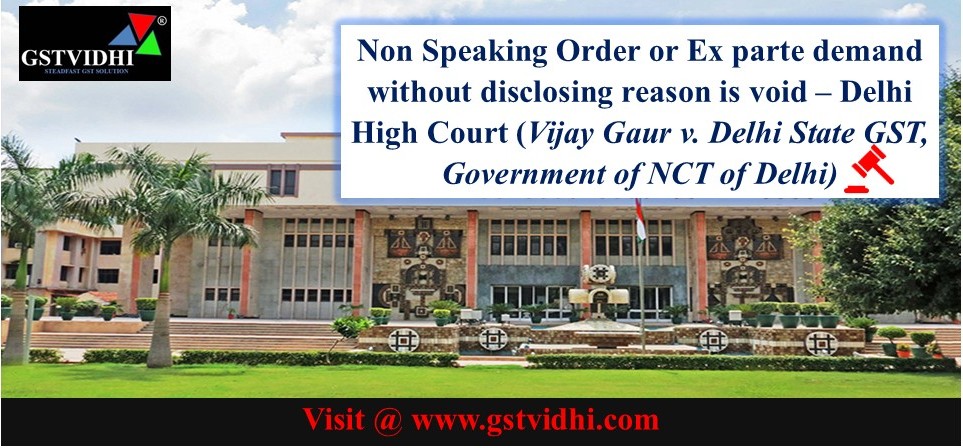
Non Speaking Order or Ex parte demand without disclosing reason
is void – Delhi High Court (Vijay Gaur v. Delhi State GST, Government of NCT
of Delhi)
Case
Summary:
In a crucial
reaffirmation of taxpayer rights under the GST regime, the Delhi High Court
on 03 March 2025 quashed an ex parte GST assessment order demanding ₹51.87
lakh from Mr. Vijay Gaur, proprietor of M/s Gaur Vijay
Electricals, for FY 2018–19. The order was passed under Section 73(9)
of the CGST/DGST Act and based entirely on alleged discrepancies between
GSTR-1, GSTR-3B, and GSTR-9.
The Court found that the
assessing officer failed to assign or disclose any reasons for the
demand in the final order and held that the mere absence of taxpayer’s reply
does not relieve the officer from passing a reasoned order.
Factual
Background
1. Show
Cause Notice Issued (11 December 2023): The petitioner,
registered under GSTIN 07AFFPG3432C1Z2, was issued a DRC-01 notice for
FY 2018–19. The SCN alleged discrepancies in GSTR-1, GSTR-3B, and GSTR-9
filings, leading to a proposed demand of:
o Tax:
₹25,52,714
o Interest:
₹23,79,270
o Penalty:
₹2,55,272
o Total:
₹51,87,256
2. Reminders
and Hearing Opportunity: A reminder notice was issued
on 12 January 2024, granting an extended deadline of 25 January 2024
and scheduling a personal hearing on 30 January 2024.
3. No
Reply or Appearance by Petitioner: The taxpayer did not
respond to the SCN or appear for the personal hearing, either personally or
through an authorized representative.
4. Ex
Parte Assessment Passed (19 March 2024): In the absence of a
reply, the Assessing Officer (AO) finalized the demand ex parte under
Section 73(9), raising a total liability of ₹51.87 lakh.
5. DRC-07
Issued (20 March 2024): The summary of the order was issued
via DRC-07 under reference ZD070324038158G.
6. Writ
Petition Filed: Aggrieved, the petitioner approached the
Delhi High Court, challenging the assessment and demand orders.
Legal
Issues
1. Whether
an ex parte GST assessment order under Section 73(9) must contain reasoned
findings, even when the taxpayer fails to respond to the SCN?
2. Can
the absence of reply or appearance justify a non-speaking order?
3. Does
failure to assign reasons render the assessment order invalid in law?
Petitioner’s
Arguments
- The SCN was generic and vague,
lacking adequate details to reply to.
- The final order did not assign any
reasoning or findings, merely stating that the taxpayer failed to
respond.
- The demand of ₹51.87 lakh was
raised without applying mind to facts, filings, or documents.
- The principle of natural justice
was violated, especially since the order affected substantial
financial rights.
Respondents’
Submissions
- The department asserted that the
petitioner had been given multiple opportunities to respond,
including:
- SCN dated 11 December 2023;
- Reminder dated 12 January 2024;
- Personal hearing fixed for 30
January 2024.
- Since no response was filed, the
officer proceeded to pass the order under statutory authority.
Court’s
Observations and Reasoning
1. Failure to Provide
Reasons Invalidates the Order
The Bench held that the absence
of taxpayer’s reply does not discharge the AO’s duty to provide a detailed,
reasoned order.
“Irrespective of whether
the assessee had chosen to submit a response to the SCN… the AO was clearly
obliged in law to assign and disclose reasons…”
2. Assessment Must
Reflect Application of Mind
Even in ex parte
proceedings, the authority must demonstrate due application of mind to
the facts and contentions, if any, and articulate why the tax, interest, and
penalty are due.
“The order clearly fails
to meet those tests…”
3. Quashed for Being a
Non-Speaking Order
The Court concluded that
the order lacked any analytical discussion of the alleged discrepancies,
and thus could not be sustained.
Final
Orders of the Court
1. Writ
Petition Allowed: The writ petition was allowed in full.
2. Order
Dated 19 March 2024 Quashed: The ex parte assessment order
under Section 73(9) was set aside for being non-speaking and legally
deficient.
3. DRC-07
Dated 20 March 2024 Quashed: The consequential demand summary
(DRC-07) was also quashed.
4. Fresh
Assessment Permitted: The department is allowed to issue a
fresh assessment order, after:
o Granting
due opportunity of reply;
o Providing
a personal hearing;
o Passing
a reasoned, speaking order.
5. All
Rights Reserved: All rights and contentions of both
parties were kept open.
Conclusion
The Vijay Gaur v.
Delhi State GST case is a strong reminder that GST assessments are not
to be treated as administrative formalities. Even where taxpayers do not
respond, the authorities must ensure that their orders meet the standards of reasoned
decision-making laid down under constitutional and statutory law.
This judgment sets an
important precedent for businesses facing ex parte GST orders—they are
not beyond judicial scrutiny if they fail to meet procedural fairness and legal
standards.
Disclaimer: All the Information is based on the notification, circular and order issued by the Govt. authority and judgement delivered by the court or the authority information is strictly for educational purposes and on the basis of our best understanding of laws & not binding on anyone.
Find the Attachment (Press on Click Here )
Click here